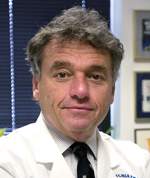User login
HUNTINGTON BEACH, CALIF. – Can you really be addicted to food?
That’s the question posed by Dr. Mark S. Gold, adjunct professor of psychiatry at the Washington University School of Medicine in St. Louis.* His answer? “Maybe not in the same sense that you can be addicted to heroin – but certain foods, especially highly manufactured, sugar-rich foods, stimulate their own taking as if they’re a drug.”
In an interview at the annual meeting of the American College of Psychiatrists, Dr. Gold – a pioneer in the so-called “food addiction hypothesis” – highlighted current trends in food and process addictions.
He noted that behavioral and medical treatments commonly used for alcohol dependence, for example, are proving effective for patients coping with overeating, obesity, and binge eating. Psychiatrists will play an expanding role in caring for such patients, he predicted.
Dr. Gold reported having no relevant financial disclosures.
*Correction, 4/2/2015: An earlier version of this story misstated Dr. Gold's title.
On Twitter @dougbrunk
HUNTINGTON BEACH, CALIF. – Can you really be addicted to food?
That’s the question posed by Dr. Mark S. Gold, adjunct professor of psychiatry at the Washington University School of Medicine in St. Louis.* His answer? “Maybe not in the same sense that you can be addicted to heroin – but certain foods, especially highly manufactured, sugar-rich foods, stimulate their own taking as if they’re a drug.”
In an interview at the annual meeting of the American College of Psychiatrists, Dr. Gold – a pioneer in the so-called “food addiction hypothesis” – highlighted current trends in food and process addictions.
He noted that behavioral and medical treatments commonly used for alcohol dependence, for example, are proving effective for patients coping with overeating, obesity, and binge eating. Psychiatrists will play an expanding role in caring for such patients, he predicted.
Dr. Gold reported having no relevant financial disclosures.
*Correction, 4/2/2015: An earlier version of this story misstated Dr. Gold's title.
On Twitter @dougbrunk
HUNTINGTON BEACH, CALIF. – Can you really be addicted to food?
That’s the question posed by Dr. Mark S. Gold, adjunct professor of psychiatry at the Washington University School of Medicine in St. Louis.* His answer? “Maybe not in the same sense that you can be addicted to heroin – but certain foods, especially highly manufactured, sugar-rich foods, stimulate their own taking as if they’re a drug.”
In an interview at the annual meeting of the American College of Psychiatrists, Dr. Gold – a pioneer in the so-called “food addiction hypothesis” – highlighted current trends in food and process addictions.
He noted that behavioral and medical treatments commonly used for alcohol dependence, for example, are proving effective for patients coping with overeating, obesity, and binge eating. Psychiatrists will play an expanding role in caring for such patients, he predicted.
Dr. Gold reported having no relevant financial disclosures.
*Correction, 4/2/2015: An earlier version of this story misstated Dr. Gold's title.
On Twitter @dougbrunk
AT THE AMERICAN COLLEGE OF PSYCHIATRISTS MEETING
